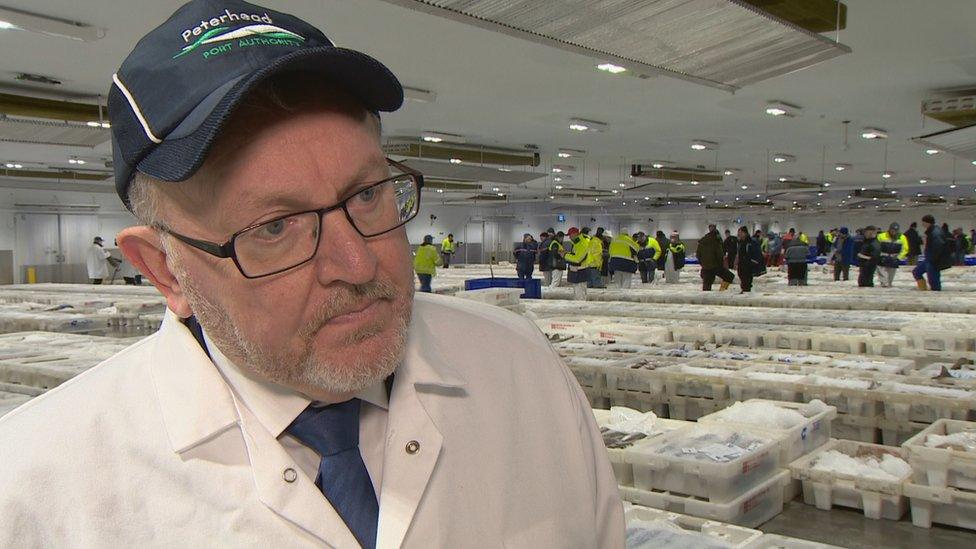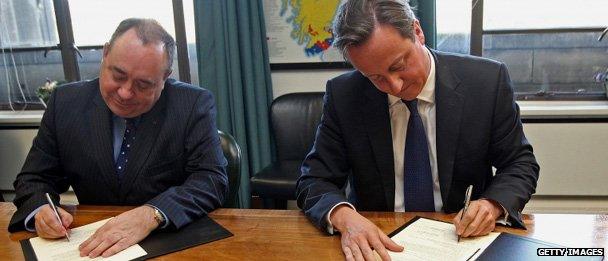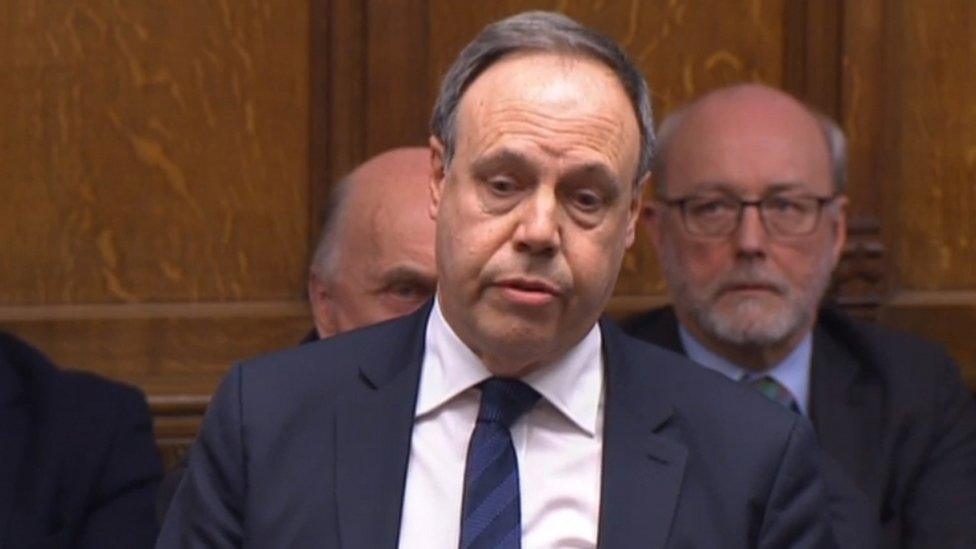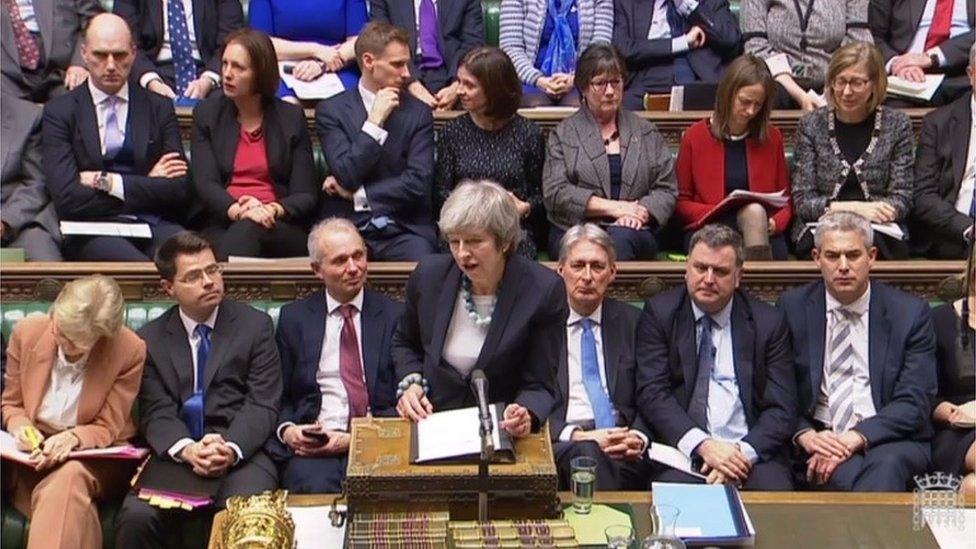Not her finest hour
- Published
Theresa May announces Tuesday's planned Brexit deal will not go ahead: "I've listened very carefully"
Not, all in all, the prime minister's finest hour. Her opening gambit, explaining the delay in the Brexit vote, was greeted with raucous laughter from the opposition benches.
There was further laughter, that most potent weapon against a speaker, when she tried to defend the details of her proposed deal, despite the deferral.
Uproar greeted her warning that a further referendum would divide the people of the UK yet again. The House seemed, for some unaccountable reason, to believe that the division was already patent and had manifested itself brutally in the Commons.
She tried the rhetorical device of posing a succession of challenging questions. That went awry when her opening query as to whether the House wanted to deliver Brexit generated a resounding bellow of "no!" from the SNP benches.
Then the Speaker John Bercow weighed in. Proposing to halt the debate on the deal after three days of discussions was, he said, "deeply discourteous" to the Commons, whose rights he is elected to champion.
For Labour, Jeremy Corbyn said she had lost control. Kirsty Blackman offered the SNP view that she had offered "a stunning display of pathetic cowardice." And Vince Cable, for the Liberal Democrats, said she had "lost all authority".
Of course, the PM was not the only one today to face an awkward set of circumstances. Such also applied to those ministers in her government obliged to deny that the vote would be delayed - until, as things turned out, it was.
There, for example, was David Mundell at Peterhead fish market at the crack of dawn this morning. Courageously sporting a white coat and a jaunty cap, he insisted the vote would go ahead. To be fair, he was not alone in this. Hey ho, that's politics.

David Mundell was sent out to insist that the vote was going ahead, hours before it was pulled
Which leaves us where. The PM says now that she sought to abandon Tuesday's vote because it was evident that there was not sufficient support in the House.
In short, she was facing defeat. It must be presumed that she was facing a huge, humiliating defeat. Otherwise, she might have risked the vote, presuming that a small margin could be overturned at a second time of asking, following internal party persuasion and external pressure from (presumably) volatile economic markets.
Theresa May also identified the principal cause of Commons disquiet: the backstop arrangement whereby EU customs rules might persist across the UK as a whole, pending a trade deal, in order to pre-empt a hard border on the island of Ireland.
No surprise there - but what is she now proposing to do? She used the words "assurance" and "reassurance" several times.
However, as legions of MPs pointed out, that could mean two things. It could mean an alteration to the text of the statutory Withdrawal Agreement in order to remove or mitigate the impact of the disliked backstop.
Alternatively, it might mean agreed statements - non-statutory promises - by which sundry players would declare their determination to avoid a hard border at all costs.
These, presumably, would be concomitant to the statutory text. They might involve statements from the UK government, the Commission - and EU remaining states, most notably the Republic of Ireland.

Could Mrs May be looking for her own version of the Edinburgh Agreement?
To some extent, this might be said to resemble the "Edinburgh Agreement" which paved the way for the Scottish independence referendum of 2014.
For example, that deal signed by David Cameron and Alex Salmond indicated that both sides would accept the outcome of the plebiscite. This was not, in itself, legally binding as it was not in statute but was thought to be an important rider to the statutory provisions for the referendum itself.
It is possible, however, that in the present case of Brexit, we are past the point where such subsidiary, non-binding statements will prove effective.
One notes that there has been minimal traction for the PM's offer to give the Commons a vote on whether the NI backstop should be triggered, albeit she repeated it again today.
Several MPs - on both sides of the chamber - stressed today that they were seeking substantive change to the Withdrawal Agreement. To be clear, the PM previously said, repeatedly, that this was impossible and EU leaders have continued to insist that the deal is done.

Mrs May relies on the DUP to keep her in government - but MP Nigel Dodds spoke strongly against her deal
No doubt the PM's wording consists partly of constructive ambiguity. She does not want to promise a wording change to the Agreement itself - in case it proves that only a back-up statement is feasible.
But she will have listened with particular care to the comment made by Nigel Dodds of the DUP, upon whom her government relies for a majority.
Mr Dodds said that the PM's revised approach simply wasn't credible. She must come back with specific changes to the wording of the Withdrawal Agreement itself - or the deal would be voted down. When, that is, a division is eventually called.
Recognise the responsibility
I was struck by another element. The PM repeatedly stressed that her deal was a good one, that in reality it remained the only option, that she would now seek "additional reassurance on the question of the backstop". That word again.
But her appeal was directed beyond her own rebellious benches. Yes, she will undoubtedly seek to persuade those Tories who currently oppose her - if she remains in office, if she is given the chance.
But it's now plain that she will appeal to members on the other side of the house, perhaps particularly to Labour members who may feel that their constituents would rather endorse a flawed agreement than witness the potential economic disruption of leaving the EU without a deal.
Mrs May said, explicitly and directly, that members across the house must recognise the responsibility that they face.
Older hands will recall that, in the 1970s, Britain joined the common market and then retained membership in a referendum, partly as a consequence of support which bridged the party divide. Which, for example, made the Conservative Prime Minister Edward Heath an ally of Labour's deputy leader Roy Jenkins on the European question.
Could such an informal alliance now secure a deal to depart from the EU? Perhaps. But we all now await the detail - and, importantly, the status - of the assurances which the PM will seek.
- Published10 December 2018
